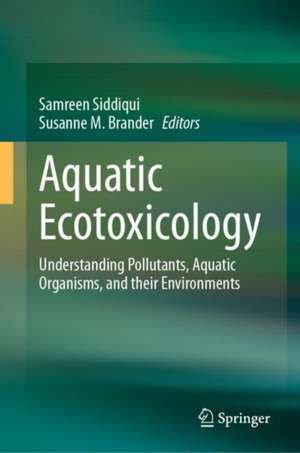Aquatic Ecotoxicology: Understanding Pollutants, Aquatic Organisms, and their Environments
Editat de Samreen Siddiqui, Susanne M. Branderen Limba Engleză Hardback – 19 mar 2024
Preț: 641.03 lei
Preț vechi: 754.15 lei
-15% Nou
Puncte Express: 962
Preț estimativ în valută:
122.68€ • 127.74$ • 103.68£
122.68€ • 127.74$ • 103.68£
Carte tipărită la comandă
Livrare economică 07-21 martie
Preluare comenzi: 021 569.72.76
Specificații
ISBN-13: 9783031531293
ISBN-10: 3031531299
Ilustrații: XIII, 168 p. 48 illus., 37 illus. in color.
Dimensiuni: 155 x 235 mm
Greutate: 0.44 kg
Ediția:2024
Editura: Springer International Publishing
Colecția Springer
Locul publicării:Cham, Switzerland
ISBN-10: 3031531299
Ilustrații: XIII, 168 p. 48 illus., 37 illus. in color.
Dimensiuni: 155 x 235 mm
Greutate: 0.44 kg
Ediția:2024
Editura: Springer International Publishing
Colecția Springer
Locul publicării:Cham, Switzerland
Cuprins
Chapter 1: Aquatic Toxicology and its Need.- Chapter 2: What are Pollutants, contaminants and chemicals of emerging concerns (CECs).- Chapter 3: Presence of CECs in the environment.- Chapter 4: Classic Contaminants in aquatic ecosystem: POPs, PFAS, heavy metals, and microplastics.- Chapter 5: How to identify a model species.- Chapter 6: Computational Methods for predictive Toxicology: In Silico Toxicology.- Chapter 7: Ecotoxicological end points and Experimental Design.- Chapter 8: Partitioning of chemicals in aquatic organisms.- Chapter 9: Aquatic ecotoxicology and human health.- Chapter 10: Adverse outcome pathways and their relevance.- Chapter 11: Ecotoxicology challenges during climate change scenario.
Notă biografică
Samreen Siddiqui is Sr. Ecotoxicologist (Water Quality Planner/Project Manager-III)in King County, WA and affiliated researcher in Oregon State University. She received her PhD in Coastal and Marine System Sciences from Texas A & M university Corpus Christi, USA in 2020 and carried out her Postdoctoral work at Oregon State University, OR, USA from 2020-2022. Her research focuses on GenX, a perfluorinated compound, pharmaceutical compound, pesticides and range of micro/nano palstics. Samreen Siddiqui served as associate editor in California Fish and Wildlife Journal (2022-23) and currently serving as member of editorial Board of IEAM (SETAC Publication)..
Susanne M. Brander has been faculty at Oregon State University since 2017, after moving from the University of North Carolina, Wilmington where she was faculty for 4 years. She also consults as a Senior Contributing Scientist for the Environmental Defense Fund. Brander’s research encompasses the fields of toxicology,endocrinology, and ecology; integrating molecular approaches with measurements at the organism and population level. Brander’s main focus is on the effects of stressors such as emerging pollutants, plastics, and changing climate on aquatic organisms, but her research and teaching also spans the links between ecological and human health. She has a Ph.D. in Toxicology and Pharmacology from UC Davis (2011), and an M.S. in Environmental Science and Policy from Johns Hopkins University (2005). Although Brander has worked in academia for the past nine years, following completion of an M.S. and prior to pursuing a Ph.D. she worked in industry as an Environmental Analyst and Project Scientist at Weston Solutions, Inc. Her research is currently funded by the Sea Grant, the Environmental Protection Agency, and the National Science Foundation. She has presented on pollution to the legislature in Salem, OR and on Capitol Hill in Washington D.C.
Susanne M. Brander has been faculty at Oregon State University since 2017, after moving from the University of North Carolina, Wilmington where she was faculty for 4 years. She also consults as a Senior Contributing Scientist for the Environmental Defense Fund. Brander’s research encompasses the fields of toxicology,endocrinology, and ecology; integrating molecular approaches with measurements at the organism and population level. Brander’s main focus is on the effects of stressors such as emerging pollutants, plastics, and changing climate on aquatic organisms, but her research and teaching also spans the links between ecological and human health. She has a Ph.D. in Toxicology and Pharmacology from UC Davis (2011), and an M.S. in Environmental Science and Policy from Johns Hopkins University (2005). Although Brander has worked in academia for the past nine years, following completion of an M.S. and prior to pursuing a Ph.D. she worked in industry as an Environmental Analyst and Project Scientist at Weston Solutions, Inc. Her research is currently funded by the Sea Grant, the Environmental Protection Agency, and the National Science Foundation. She has presented on pollution to the legislature in Salem, OR and on Capitol Hill in Washington D.C.
Textul de pe ultima copertă
This textbook offers a basic understanding of aquatic ecotoxicology from molecular to physiological levels for graduate and advanced undergraduate students. The book covers the guidelines and lab protocols used by international organizations for ecotoxicology studies, and discusses the challenges faced by aquatic organisms in a changing climate from an ecotoxicological perspective. Readers will learn about pollutants, contaminants and chemicals of emerging concern (CECs) in aquatic environments, their impacts on environmental and human health, and what techniques can be used to curb and control their adverse impacts. The book will be useful for students in aquatic ecotoxicology, environmental pollution and marine biochemistry.
Caracteristici
Provides a basic understanding of aquatic ecotoxicology Discusses the challenges faced by aquatic organisms in a changing climate from an ecotoxicological perspective Covers guidelines and lab protocols used by international organizations in ecotoxicology studies
